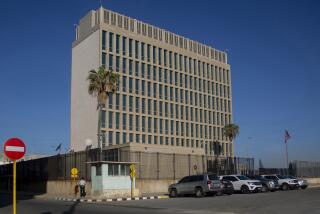Study of Gulf Veterans’ Illnesses Urged : Military: National Institutes of Health says extensive research is needed to understand underlying causes. 20,000 troops reported symptoms.
WASHINGTON — A National Institutes of Health panel recommended Friday that extensive research be conducted into the mysterious spate of illnesses reported by men and women who served in the Persian Gulf War.
The committee concluded that the “complex biological, chemical, physical and psychological environment” of the operation produced a range of illnesses “with overlapping symptoms and causes” and that collaborative government-supported programs should be established to study them.
The committee “was moved by the extent of suffering among Persian Gulf veterans,” said Dr. Gareth Green, professor of environmental health at the Harvard University School of Public Health, who served as chairman. “There is a clear need for continuing and compassionate care for these veterans as well as concerted research efforts to understand the underlying causes of these illnesses.”
Nearly 700,000 troops served in the Persian Gulf in 1990 and 1991. The panel estimated that 20,000 or more of them have reported an array of debilitating symptoms, including fatigue, skin rash, muscle and joint pain, headache, memory loss, shortness of breath and gastrointestinal and respiratory problems.
No single substance or organism has been identified as the sole cause of the health problems, although many of the troops were exposed to a variety of potentially toxic chemicals, such as fumes and smoke from oil well fires, toxic pesticides and uranium used in munitions and armor.
In urging the study, panel member David W. Gorman, deputy national legislative director of the Disabled American Veterans, recalled the health consequences of Agent Orange, an herbicide used during the Vietnam War.
After many years of controversy, exposure to it ultimately was blamed for health problems experienced by Vietnam War veterans.
The Persian Gulf Veterans Coordinating Board, which includes representatives from the departments of Defense, Veterans Affairs and Health and Human Services, said in a statement that it would “carefully review” the panel’s recommendations.
The board, established to coordinate interdepartmental activities aimed at resolving health concerns of Persian Gulf veterans, said it supports further studies and predicted that they “will bring us closer to answers concerning the causes and cures for unexplained Gulf War illnesses.”
The three departments already are engaged in more than 20 research projects related to health, environmental effects, chemical agents and depleted uranium during the war, the statement said.
The board urged veterans experiencing health problems to contact a VA medical center for a free examination.
The panel also recommended sending a health questionnaire to all of the nation’s 700,000 veterans, or a representative sample in an effort to uncover health problems.
The panel attributed cases of leishmaniasis--a parasitic infection transmitted by the bite of sand flies--and post-traumatic stress disorder to service in the Persian Gulf. The committee urged the Department of Veterans Affairs to develop “more responsive and effective approaches” for the diagnosis and treatment of stress-related illness.
Stress-related disorders have been associated in the past with service in Vietnam and in the two world wars, although they were identified belatedly.
Persian Gulf service “was an experience of unprecedented stress for our military and their families,” Green said. “The known threat of chemical or biological warfare by the Iraqis had a tremendous psychological impact. . . . We must learn more about the influencing effects of the central nervous system on immunological, cardiac, respiratory and gastrointestinal function.”
More to Read
Sign up for Essential California
The most important California stories and recommendations in your inbox every morning.
You may occasionally receive promotional content from the Los Angeles Times.










